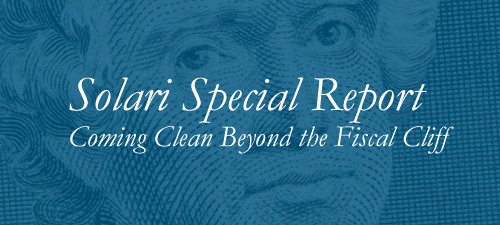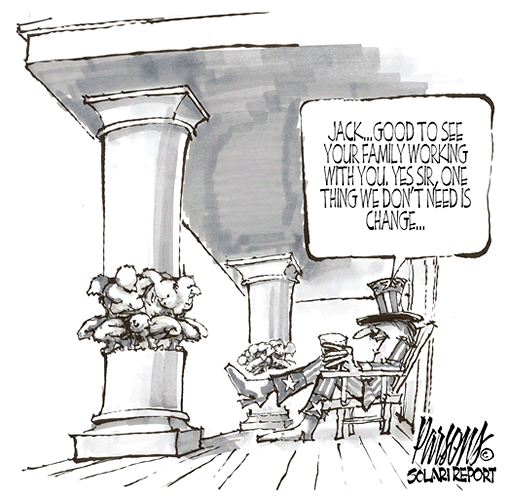by Catherine Austin Fitts
“Information is the hardest currency.”
~Andrew Vachss
~Andrew Vachss
Washington’s negotiations to address the fiscal cliff of automatic tax increases and spending cuts legislatively triggered at the close of 2012 are the latest in an ongoing effort to address increasing U.S. federal government deficits and debt levels. Enormous monetary and fiscal stimulus has failed to produce an economic recovery. In short, the U.S. government and central banks have failed to dig out. Instead, they are now dug in deeper. What to do now?
What is missing from this and other debates on the reengineering of the U.S. federal finances is an understanding or discussion of the structural problems in the federal finances that have been accumulating since WWII, when the United States – with 6% of the world’s population – found itself the master of 50% of the world’s resources.
The purpose of this article is to provide an overview of some of these structural issues in the hope that more citizens will be encouraged to consider how the federal finances flow through the immediate world around us – our household budget, our business, farm or place of work, our municipality – and the government-sponsored organized crime and fraud draining us, so we can begin to implement real solutions.
Ultimately, the fiscal cliff is the tip of the iceberg of our economic and cultural woes. Our problems are deeper. The more of us there are, who are prepared to look honestly at our situation and take responsibility for it, the sooner authentic solutions will become possible and emerge.
As we look over the fiscal cliff into our financial abyss, now is a good time to “Come Clean” about the real state of our lives, our communities, and our economy, starting with the U.S. federal finances that flow deeply and intimately throughout every aspect of our lives.
First, a Story
Imagine that you live in a historical mansion in a large, privileged family on a fine property — rich with good land, good water and natural resources that your ancestors originally acquired through surreptitious means.
Imagine that the mansion and estate have serious structural problems that accumulated over many years. The reasons are complex.
There is enormous distrust within the family. As the vigor of the generations dissipated, expenses rose and numerous members have turned to activities that are unproductive at best, or fraudulent and criminal at worst.
Those in charge of family finances were highly distrustful of the collective family intelligence and wisdom, and have mortgaged the estate and cut reinvestment in infrastructure to liquidate as much capital as possible to reinvest abroad – albeit in hidden legal forms. They have engaged in numerous criminal activities, including ones that had significantly harmed the neighborhood economy.
Almost no one in the family objected as allowances continued to be funded, even increased and promises continued to be made. As long as everyone was getting his or her check, most everyone was willing to ignore the deterioration of the real human and physical assets and equity on the family balance sheet. They were also willing to ignore the harm done to their neighbors.
The occasional relative who demanded a financial accounting of what was happening, or was not satisfied with petty bribes of various kinds, was sent packing or to work abroad, or even occasionally dealt with in a way that we pretend never happens – they developed diseases, were admitted to mental institutes, were said to have committed suicide or just disappeared. These instances were sufficient to strike terror throughout the family, leaving those in command of the family trusts unquestioned, as their offshore accounts and numerous enterprises grew.
The result was a fragile peace that grew thin, as the deterioration in the infrastructure of the estate and the structure of the mansion accelerated. Innovation was not encouraged. The managers were interested in their own global competition. They did not want any pesky entrepreneurs taking risks that could in any way attract attention or create liabilities for their grand plans. Indeed, young members were encouraged to use student loans to get their advanced education, thus ensuring their dependence on their allowance and reluctance to branch out on their own. Thus the family members’ general understanding of the world around them and how to navigate it deteriorated rapidly.
So now the day has come when the deterioration in the management of the estate, the growing debt, the structural problems in the mansion and the diminution of the family trusts has necessitated a dramatic reduction in allowances.
Those in control face a marketing challenge. How do they arrange a dramatic reduction in allowances without providing an accounting of where monies had gone, thus threatening their offshore holdings and enterprises, or exposing criminal liabilities to their global enemies? How do they maintain control without the continual flow of allowances to placate family members? And what would happen when the family members discover that their retirement savings and benefits are empty promises?
A task force was commissioned of family lawyers and counselors to make recommendations as to what could be done. They were instructed by the controlling family members to only make recommendations that involved cutting allowances or required contributions from those receiving them.
Under no circumstances were they to ask for a real accounting, delve into the issues related to where family capital had been shifted abroad, the fundamental flaws in the family governance systems, property infrastructure needs, or the need for serious investment in the mansion foundation, let alone how to reinvigorate the prosperity of the land and property and the productivity and health of family members.
They were to deal only with whose allowance were to get cut and by how much,and how much various family members should contribute to a fund to restore the property.
The family lawyers and counselors wanted to keep their jobs and they certainly did not want to be “suicided.” So for months, they argued over proposals — none of which addressed the real problems, let alone solved them.
After months of this, the family members reached a unique consensus. Their lawyers and counselors were incompetent and should be replaced by new ones. Who would, of course, be subject to the same restrictions….



















